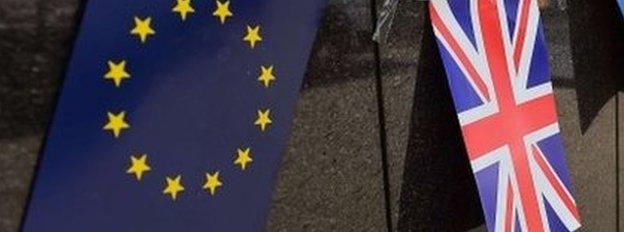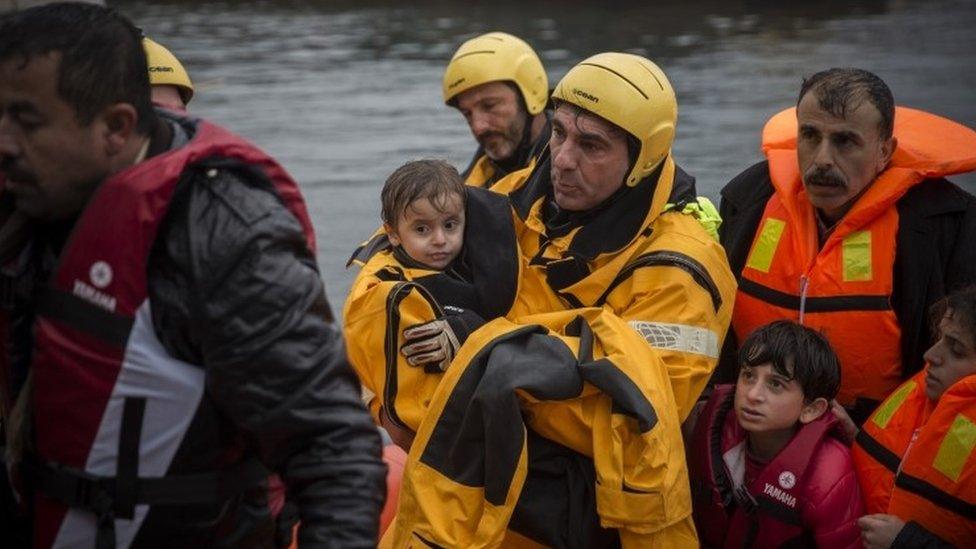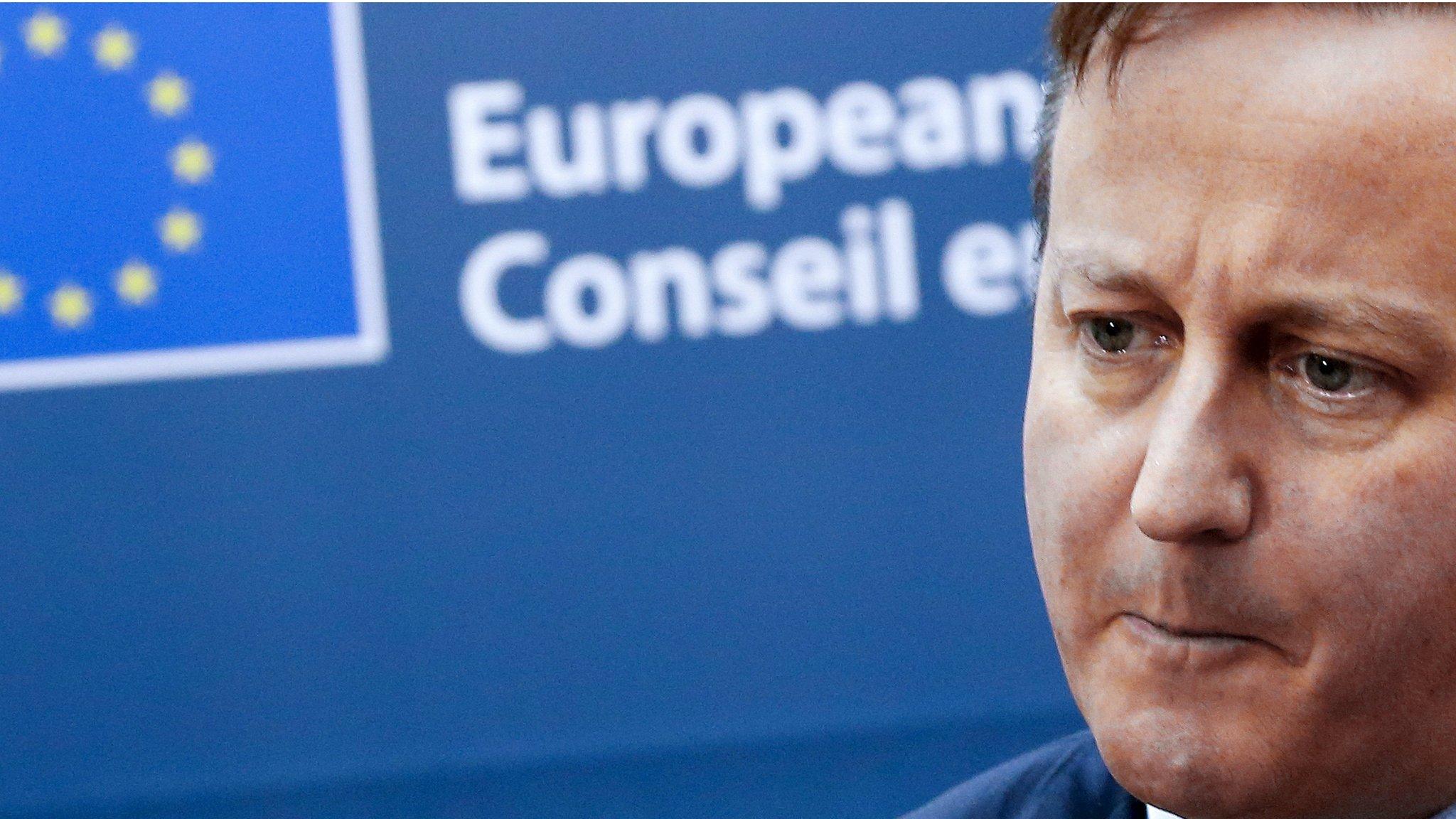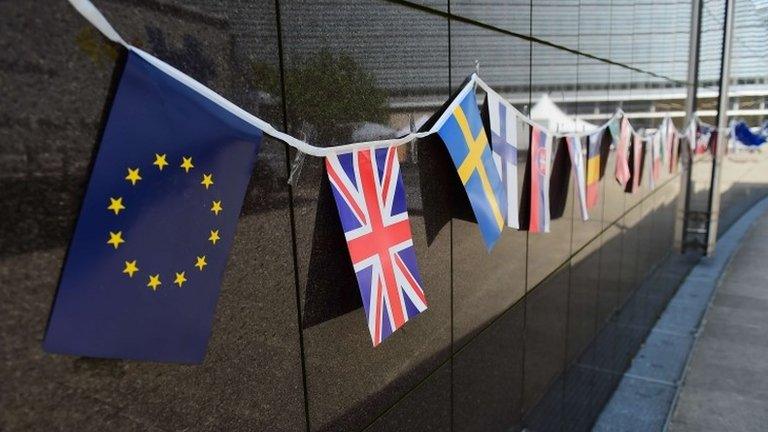EU talks: Cameron says UK will get new deal in 2016
- Published
David Cameron said 2016 will be the year when Britain achieves vital reform of the EU
David Cameron has said the UK will "fundamentally change" its relationship with the EU in 2016, after talks with EU leaders in Brussels.
The UK prime minister said he was a "step closer" to getting the reforms he wanted, which he will put to the British people in a referendum.
He said it would be "pretty tight" to get a deal by February as he had hoped - but it would happen next year.
Eurosceptics said his reform demands were trivial.
And Labour leader Jeremy Corbyn said he believed little of substance would be secured in the next six weeks before EU leaders meet again.
Mr Cameron is demanding change on four issues, including stopping in-work benefits for EU migrants in the UK for four years.
He set them out in detail to fellow EU leaders in Brussels on Thursday night.
'Bring it home'
Speaking to reporters earlier on Friday, he said the EU was "well on the way" to an agreement.
But he warned that there were "difficulties" in a number of areas and a lot of hard work would be required between now and February, the date of the next European Council meeting, to "bring it home".
"We've made good progress, we are a step closer to agreement on the significant and far-reaching reforms I have proposed," he said.
"It is going to be tough and there is a lot of hard work to do. But I believe 2016 will be the year we achieve something really vital, fundamentally changing the UK's relationship with the EU and finally addressing the concerns of the British people about our membership.
"Then it will be for the British people to decide whether we remain or leave."

Analysis by BBC Political Editor Laura Kuenssberg
Even after difficult talks, here was what seemed a new confidence from David Cameron that he can achieve a deal and then a public vote next year.
He was careful to say the timetable might slip, acknowledging it is tight. But there is a new urgency.
Katya Adler: Cameron's EU demands: UK 'mini treaty' among options

The PM, who is known to favour a vote in 2016, would not be drawn on claims that next June was being targeted, saying that the substance of the negotiations were more important than the timing.
Other EU leaders have expressed their desire to accommodate UK demands but only if core EU principles, including on the right to freedom of movement, are respected and not undermined.
'Hammered'
European Council president Donald Tusk said other countries were willing to look for compromises while German Chancellor Angela Merkel said she was "optimistic" agreement could be reached and enshrining the changes through treaty changes, a key UK demand, was conceivable.
But UKIP leader Nigel Farage, who wants Britain out of the EU, said Mr Cameron "came, saw, and got hammered".
David Cameron on EU deal: "What matters is the substance...rather than the timing"
David Cameron: There is 'path' to EU deal
And Vote Leave, one of the groups campaigning for the UK to leave the EU, said the UK's proposed curbs on migrants benefits was "tinkering" and wouldn't impact on levels on EU migration.
"The renegotiation has amounted to little more than a smoke-and-mirrors exercise," said its chief executive Matthew Elliott. "David Cameron isn't offering the fundamental change he promised the British people."
And Mr Corbyn said a ban on EU migrants' benefits was potentially discriminatory and questioned whether it would discourage them from coming to the UK.
"The amount paid to migrants is very, very small. They are paying tax like everyone else, they are entitled to those benefits in my view," he said.
"If the government pursues this strategy to not allow them to access in work benefits it actually becomes very discriminatory, and therefore there is a legal problem about that."
Figures published on Friday showed the number of refugees and migrants who've entered Europe by land and sea this year has reached nearly one million.
The International Organisation for Migration says 991,000 - more than four times the number for 2014.

UK's EU referendum in-depth

- Published18 December 2015

- Published14 December 2015

- Published18 December 2015
- Published17 February 2016

- Published30 December 2020
